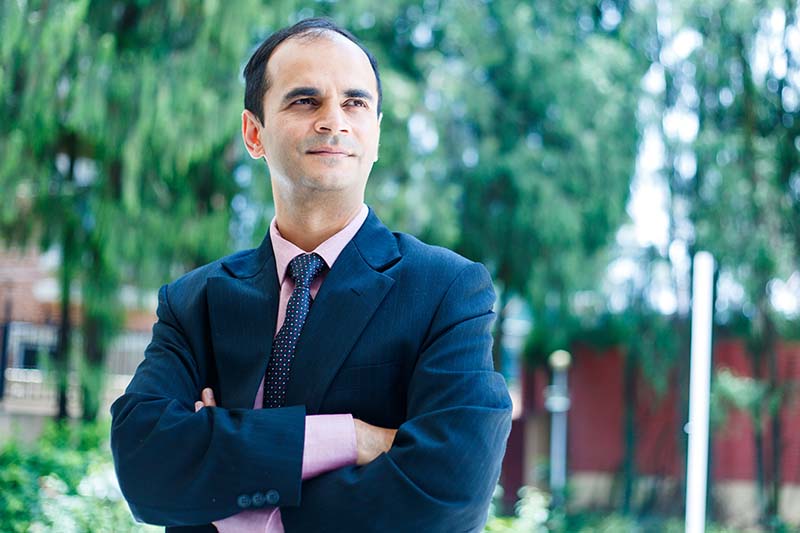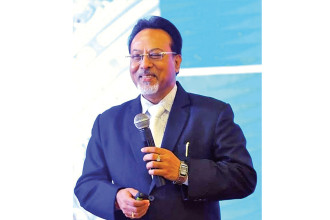
Dr. Aquil Busrai is the CEO of Aquil Busrai Consulting in India. He has worked with illustrious companies like Unilever, Motorola and IBM in the human resource department. In May, he was in Kathmandu to attend the Human Capital Conference hosted by NBI (National Banking Institute). Business 360 caught up with Dr. Busrai to learn about current human resource practices and trends. Excerpts:
During the Executive Series Power Talk: Leadership Role in Creating Winning Human Capital DNA you expressed rather firmly that in the name of interacting with millennial employees, you do not subscribe to the idea that CEOs take selfies with them or attend Zumba classes together. What do you mean?
Handling millennial workforce does require a very different approach as compared to the traditional workforce. Taking selfies and joining Zumba dance may be desirable once in a while, but what I had mentioned was that these alone will not address the millennials’ need. What they get attracted to is personal growth in terms of additional skill, technical skill and up-gradation of their knowledge. Having fun at workplace is desirable but what is more critical is to address the intrinsic need of the millennial which is that of providing them knowledge and coaching.In what capacity did the companies that you earlier worked with employ the human capital concept?
In my 45 years of career in Human Resources, I have been fortunate to have had the opportunity to conceptualise and execute various HR initiatives. These HR interventions were designed specifically for the situation on hand and in the context of what the organisation needed. Looking back there is a sense of satisfaction in having provided human capital support and solution to business issues. It is important to keep in mind that any HR solution must be business-centric. It should most definitely address business issues and provide the right solution for business growth. Just because certain HR practices are happening in other organisations is not good enough reason to ape the practice in one’s own organisation.The CEO of NBI announced during the program that you have expressed interest in mentoring two mid-level bankers from Nepal? What prompted this decision?
There were two main reasons: One, I have an emotional connect with Nepal that I am unable to explain. But the attachment is there and I am happy for it. Second, I have experienced the power of coaching. In the past seven years I have coached CEOs as well as senior managers and also high potential middle management staff. I have proffered to provide Executive Coaching to two Nepali high potential youngsters as a gesture of my commitment to Nepal’s HR development. There is a need to leverage executive coaching in the developing economy of Nepal.How do you quantify human capital? Are all skills or characteristics measurable?
Numerically quantifying human capital may not actually be necessary. What is important is to measure its effectiveness in terms of how much impact it has made on business. This can be measured and can be a source of satisfaction too. Organisations that are able to attract and retain high quality talent, invariably have far better business results. These organisations have invested in their human capital and thus have a competitive advantage. Their employees are better skilled and more motivated. This happens only when the organisation has put appropriate human capital practices in place.When a company invests in human capital (via education, training, medical treatment), how does it ensure that the investment translates into increase in worker productivity and company profitability?
Investment in human capital increases the net worth of employees. Their skill and knowledge is kept up to date. As a result, their work, both in terms of productivity and quality, improves. This improved performance is reflected in the better functioning of the organisation and better business. With better business, employees get better rewards which motivates them further. Thus a virtuous cycle is set in motion. The organisation is able to attract and retain better quality people and thuss continues to have a competitive edge in the market. Investment in human capital never goes waste.How important is it for the health of the company that the HR department keeps proposing and implementing innovative HR practices?
A good HR department should, first of all, understand the business thoroughly. After understanding the business, HR will be in a position to recommend people practices that are relevant and beneficial to the organisation. In absence of understanding the business requirement, many HR professionals introduce HR practices that they have come across in some other organisation and seem attractive. This aping process is actually harmful for the organisation because people solutions and practices to be effective must be customised for individual organisationWhat kind of role can HR play in shaping an organisation?
HR can facilitate culture building in an organisation. This would include values and ethos that make the organisation distinct. HR can also help in creating conducive work environment through fair and equitable HR policies. It can keep the talent pool healthy through differentiated rewards and tracking performance to ensure that the quality of manpower is maintained. It is absolutely crucial that HR adds value to business. What have you learnt about human nature from being in HR for over three decades? My lesson has been that people handling skills are universal. They are not dependent on the health of the country’s economy nor economic advancement. People react to similar stimuli across various cultures and these stimuli are respect for individual and fair treatment. Most human relation issues will be resolved if these two aspects are taken care of. HR thus has to be a champion of the principles and ensure adherence. HR has to play the role of employee advocacy.Having worked with illustrious companies, what HR practices followed by those companies do you practice at Aquil Busrai Consulting?
I have been fortunate to have worked with Unilever, Motorola, Shell and IBM. All these great organisations (like other notable ones) have few practices in common – 1) They adhere to high values and ethical standards. They have zero tolerance about violation of values. 2) All great companies invest in developing people. They become a source of leaders for other organisations but this does not deter them from continuing to invest in people development 3) All such organisations have high respect for individuals and they ensure that dignity of individual is preserved. 4) All successful organisations reward their performers differentially. Those who contribute more, get substantially higher rewards. This is executed through a fair performance appraisal process. All these principles can be adopted by any other organisations wishing to make a mark.What qualities of leadership have you nurtured in yourself?
I am constantly learning and I have yet to develop many more qualities. Amongst the traits that I value most and would like to continue to practice are a) Modesty b) Thirst for learning and c) Passion. I feel these three traits have served me well in my personal growth and I only hope that I continue to build on them.
Published Date: July 12, 2017, 12:00 am
Post Comment
E-Magazine
RELATED Face 2 Face





